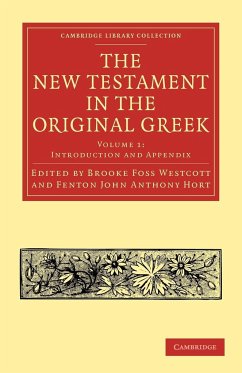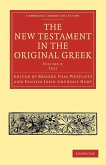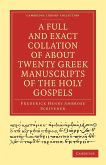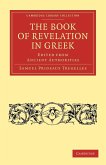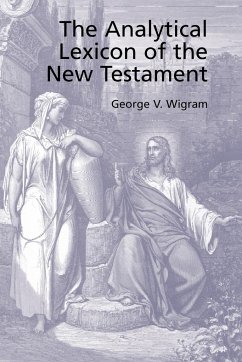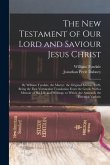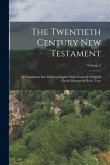The New Testament in the Original Greek
Herausgeber: Westcott, Brooke Foss; Brooke Foss, Westcott; Hort, Fenton John Anthony
The New Testament in the Original Greek
Herausgeber: Westcott, Brooke Foss; Brooke Foss, Westcott; Hort, Fenton John Anthony
- Broschiertes Buch
- Merkliste
- Auf die Merkliste
- Bewerten Bewerten
- Teilen
- Produkt teilen
- Produkterinnerung
- Produkterinnerung
This book describes the revolutionary methods used by Westcott and Hort in editing the Greek New Testament (1881).
Andere Kunden interessierten sich auch für
![The New Testament in the Original Greek The New Testament in the Original Greek]() The New Testament in the Original Greek61,99 €
The New Testament in the Original Greek61,99 €![A Full and Exact Collation of About Twenty Greek Manuscripts of the Holy Gospels A Full and Exact Collation of About Twenty Greek Manuscripts of the Holy Gospels]() Frederick Henry Ambrose ScrivenerA Full and Exact Collation of About Twenty Greek Manuscripts of the Holy Gospels35,99 €
Frederick Henry Ambrose ScrivenerA Full and Exact Collation of About Twenty Greek Manuscripts of the Holy Gospels35,99 €![The Book of Revelation in Greek Edited from Ancient Authorities The Book of Revelation in Greek Edited from Ancient Authorities]() Samuel Prideaux TregellesThe Book of Revelation in Greek Edited from Ancient Authorities34,99 €
Samuel Prideaux TregellesThe Book of Revelation in Greek Edited from Ancient Authorities34,99 €![The Analytical Greek Lexicon of the New Testament The Analytical Greek Lexicon of the New Testament]() George V. WigramThe Analytical Greek Lexicon of the New Testament28,99 €
George V. WigramThe Analytical Greek Lexicon of the New Testament28,99 €![A new Literal Translation From the Original Greek of all the Apostolical Epistles: With a Commentary and Notes, Philological, Critical, Explanatory, a A new Literal Translation From the Original Greek of all the Apostolical Epistles: With a Commentary and Notes, Philological, Critical, Explanatory, a]() James MacknightA new Literal Translation From the Original Greek of all the Apostolical Epistles: With a Commentary and Notes, Philological, Critical, Explanatory, a30,99 €
James MacknightA new Literal Translation From the Original Greek of all the Apostolical Epistles: With a Commentary and Notes, Philological, Critical, Explanatory, a30,99 €![The New Testament of Our Lord and Saviour Jesus Christ: By William Tyndale, the Martyr. the Original Edition, 1526, Being the First Vernacular Transla The New Testament of Our Lord and Saviour Jesus Christ: By William Tyndale, the Martyr. the Original Edition, 1526, Being the First Vernacular Transla]() William TyndaleThe New Testament of Our Lord and Saviour Jesus Christ: By William Tyndale, the Martyr. the Original Edition, 1526, Being the First Vernacular Transla34,99 €
William TyndaleThe New Testament of Our Lord and Saviour Jesus Christ: By William Tyndale, the Martyr. the Original Edition, 1526, Being the First Vernacular Transla34,99 €![The Twentieth Century New Testament; a Translation Into Modern English Made From the Original Greek (Wescott & Hort's Text); Volume 2 The Twentieth Century New Testament; a Translation Into Modern English Made From the Original Greek (Wescott & Hort's Text); Volume 2]() AnonymousThe Twentieth Century New Testament; a Translation Into Modern English Made From the Original Greek (Wescott & Hort's Text); Volume 220,99 €
AnonymousThe Twentieth Century New Testament; a Translation Into Modern English Made From the Original Greek (Wescott & Hort's Text); Volume 220,99 €-
-
-
This book describes the revolutionary methods used by Westcott and Hort in editing the Greek New Testament (1881).
Hinweis: Dieser Artikel kann nur an eine deutsche Lieferadresse ausgeliefert werden.
Hinweis: Dieser Artikel kann nur an eine deutsche Lieferadresse ausgeliefert werden.
Produktdetails
- Produktdetails
- Verlag: Cambridge University Press
- Seitenzahl: 550
- Erscheinungstermin: 5. November 2009
- Englisch
- Abmessung: 216mm x 140mm x 32mm
- Gewicht: 767g
- ISBN-13: 9781108007085
- ISBN-10: 1108007082
- Artikelnr.: 28182851
- Herstellerkennzeichnung
- Libri GmbH
- Europaallee 1
- 36244 Bad Hersfeld
- gpsr@libri.de
- Verlag: Cambridge University Press
- Seitenzahl: 550
- Erscheinungstermin: 5. November 2009
- Englisch
- Abmessung: 216mm x 140mm x 32mm
- Gewicht: 767g
- ISBN-13: 9781108007085
- ISBN-10: 1108007082
- Artikelnr.: 28182851
- Herstellerkennzeichnung
- Libri GmbH
- Europaallee 1
- 36244 Bad Hersfeld
- gpsr@libri.de
Prefatory remarks
Part 1. The Need of Criticism for the Text of the New Testament: 1. Transmission by writing
2. Transmission by printed editions
3. History of present edition
Part 2. The Methods of Textual Criticism: Section 1. Internal Evidence of Readings: 1. Intrinsic probability
2. Transcriptional probability
Section 2. Internal Evidence of Documents
Section 3. Genealogical Evidence: 1. Simple or divergent genealogy
2. Genealogy and number
3. Manner of discovering genealogy
4. Complications of genealogy by mixture
5. Applications of genealogy
6. Variable use of genealogy according to unequal preservation of documents
Section 4. Internal Evidence of Groups
Section 5. Recapitulation of Methods in Relation to Each Other
Section 6. Criticism as Dealing with Errors Antecedent to Existing Texts: 1. Primitive errors
2. Removal of primitive errors by conjecture
Part 3. Application of Principles of Criticism to the Text of the New Testament: Section 1. Preliminary Chronological Survey of Documents: 1. Greek MSS
2. Versions
3. Fathers
4. Documentary preparation for this edition
Section 2. Results of Genealogical Evidence Proper: 1. Determination of the genealogical relations of the chief ancient texts
2. Characteristics of the chief ancient texts
3. Sketch of Postnicene textual history
4. Relations of the principal extant documents to the chief ancient texts
5. Identification and estimation of readings as belonging to the chief ancient texts
6. Review of previous criticism with reference to ancient texts
Section 3. Results of Internal Evidence of Groups and Documents: 1. Documentary groups as limited by reference to primary Greek MSS generally
2. Documentary groups as limited by reference to the best primary Greek MSS
Section 4. Substantial Integrity of the Purest Transmitted Text
Part 4. Nature and Details of this Edition
Appendix 1. Notes on select readings
Appendix 2. Notes on orthographical alternative readings
Appendix 3. Quotations from the Old Testament.
Part 1. The Need of Criticism for the Text of the New Testament: 1. Transmission by writing
2. Transmission by printed editions
3. History of present edition
Part 2. The Methods of Textual Criticism: Section 1. Internal Evidence of Readings: 1. Intrinsic probability
2. Transcriptional probability
Section 2. Internal Evidence of Documents
Section 3. Genealogical Evidence: 1. Simple or divergent genealogy
2. Genealogy and number
3. Manner of discovering genealogy
4. Complications of genealogy by mixture
5. Applications of genealogy
6. Variable use of genealogy according to unequal preservation of documents
Section 4. Internal Evidence of Groups
Section 5. Recapitulation of Methods in Relation to Each Other
Section 6. Criticism as Dealing with Errors Antecedent to Existing Texts: 1. Primitive errors
2. Removal of primitive errors by conjecture
Part 3. Application of Principles of Criticism to the Text of the New Testament: Section 1. Preliminary Chronological Survey of Documents: 1. Greek MSS
2. Versions
3. Fathers
4. Documentary preparation for this edition
Section 2. Results of Genealogical Evidence Proper: 1. Determination of the genealogical relations of the chief ancient texts
2. Characteristics of the chief ancient texts
3. Sketch of Postnicene textual history
4. Relations of the principal extant documents to the chief ancient texts
5. Identification and estimation of readings as belonging to the chief ancient texts
6. Review of previous criticism with reference to ancient texts
Section 3. Results of Internal Evidence of Groups and Documents: 1. Documentary groups as limited by reference to primary Greek MSS generally
2. Documentary groups as limited by reference to the best primary Greek MSS
Section 4. Substantial Integrity of the Purest Transmitted Text
Part 4. Nature and Details of this Edition
Appendix 1. Notes on select readings
Appendix 2. Notes on orthographical alternative readings
Appendix 3. Quotations from the Old Testament.
Prefatory remarks
Part 1. The Need of Criticism for the Text of the New Testament: 1. Transmission by writing
2. Transmission by printed editions
3. History of present edition
Part 2. The Methods of Textual Criticism: Section 1. Internal Evidence of Readings: 1. Intrinsic probability
2. Transcriptional probability
Section 2. Internal Evidence of Documents
Section 3. Genealogical Evidence: 1. Simple or divergent genealogy
2. Genealogy and number
3. Manner of discovering genealogy
4. Complications of genealogy by mixture
5. Applications of genealogy
6. Variable use of genealogy according to unequal preservation of documents
Section 4. Internal Evidence of Groups
Section 5. Recapitulation of Methods in Relation to Each Other
Section 6. Criticism as Dealing with Errors Antecedent to Existing Texts: 1. Primitive errors
2. Removal of primitive errors by conjecture
Part 3. Application of Principles of Criticism to the Text of the New Testament: Section 1. Preliminary Chronological Survey of Documents: 1. Greek MSS
2. Versions
3. Fathers
4. Documentary preparation for this edition
Section 2. Results of Genealogical Evidence Proper: 1. Determination of the genealogical relations of the chief ancient texts
2. Characteristics of the chief ancient texts
3. Sketch of Postnicene textual history
4. Relations of the principal extant documents to the chief ancient texts
5. Identification and estimation of readings as belonging to the chief ancient texts
6. Review of previous criticism with reference to ancient texts
Section 3. Results of Internal Evidence of Groups and Documents: 1. Documentary groups as limited by reference to primary Greek MSS generally
2. Documentary groups as limited by reference to the best primary Greek MSS
Section 4. Substantial Integrity of the Purest Transmitted Text
Part 4. Nature and Details of this Edition
Appendix 1. Notes on select readings
Appendix 2. Notes on orthographical alternative readings
Appendix 3. Quotations from the Old Testament.
Part 1. The Need of Criticism for the Text of the New Testament: 1. Transmission by writing
2. Transmission by printed editions
3. History of present edition
Part 2. The Methods of Textual Criticism: Section 1. Internal Evidence of Readings: 1. Intrinsic probability
2. Transcriptional probability
Section 2. Internal Evidence of Documents
Section 3. Genealogical Evidence: 1. Simple or divergent genealogy
2. Genealogy and number
3. Manner of discovering genealogy
4. Complications of genealogy by mixture
5. Applications of genealogy
6. Variable use of genealogy according to unequal preservation of documents
Section 4. Internal Evidence of Groups
Section 5. Recapitulation of Methods in Relation to Each Other
Section 6. Criticism as Dealing with Errors Antecedent to Existing Texts: 1. Primitive errors
2. Removal of primitive errors by conjecture
Part 3. Application of Principles of Criticism to the Text of the New Testament: Section 1. Preliminary Chronological Survey of Documents: 1. Greek MSS
2. Versions
3. Fathers
4. Documentary preparation for this edition
Section 2. Results of Genealogical Evidence Proper: 1. Determination of the genealogical relations of the chief ancient texts
2. Characteristics of the chief ancient texts
3. Sketch of Postnicene textual history
4. Relations of the principal extant documents to the chief ancient texts
5. Identification and estimation of readings as belonging to the chief ancient texts
6. Review of previous criticism with reference to ancient texts
Section 3. Results of Internal Evidence of Groups and Documents: 1. Documentary groups as limited by reference to primary Greek MSS generally
2. Documentary groups as limited by reference to the best primary Greek MSS
Section 4. Substantial Integrity of the Purest Transmitted Text
Part 4. Nature and Details of this Edition
Appendix 1. Notes on select readings
Appendix 2. Notes on orthographical alternative readings
Appendix 3. Quotations from the Old Testament.

